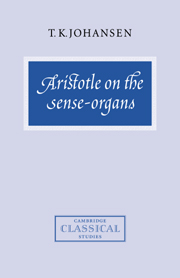Conclusion
Published online by Cambridge University Press: 22 September 2009
Summary
To conclude, I wish to relate the various strands of the argument to the questions that I raised in the Introduction. In particular, I want to explore whether Aristotle's explanation of the sense-organs sheds any light on the functionalist debate.
I began this study by asking why we have sense-organs. Aristotle's answer was based on the idea that the sense-faculties are potentialities to be changed by certain objects. These potentialities are found only in certain sorts of matter. That was why we needed sense-organs. The sense-organs were the necessary material basis of perception. The matter had to be matter of a certain sort. For example, the ability to be changed by colours was known as transparency. But transparency was found only in certain sorts of matter, such as water. That was why the organ of vision was made of water. Similarly, the ability to be changed by sound was found only in matter that was resonant, such as air. That was why the organ of hearing was made of air. The ability to be changed by odours was found in water or air because both were potentially like odours, dry. So the organ of smell was made of water or air. The organ of touch consisted of all the elements, for it was only a mixture of the four elements that would make the sense-organ potentially like all the tangible qualities, the proper objects of touch.
- Type
- Chapter
- Information
- Aristotle on the Sense-Organs , pp. 281 - 291Publisher: Cambridge University PressPrint publication year: 1997

